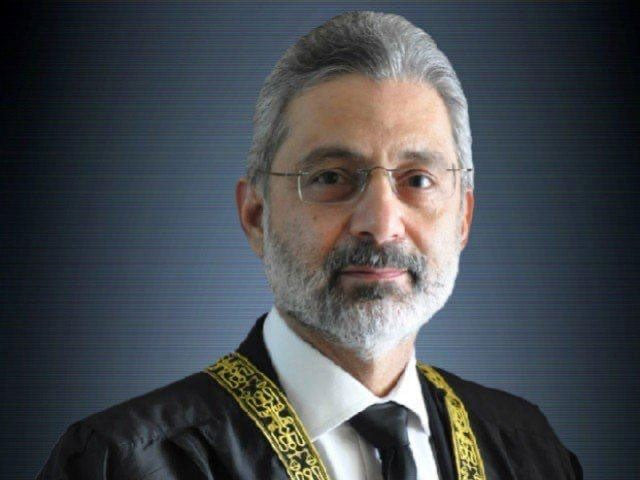Afghan replaces Munib on review case bench
CJ says ruling on Article 63-A seemed to make no-confidence motion ineffective

Chief Justice of Pakistan Qazi Faez Isa observed on Tuesday that the Supreme Court ruling regarding the interpretation of Article 63-A seemed to have been made to make the no-confidence motion ineffective.
During the hearing of the review petition filed by the Supreme Court Bar Association (SCBA), the federal government and the Pakistan Peoples Party (PPP) supported the petitioner. The hearing was conducted by a reconstituted five-member bench, led by Chief Justice Isa.
The review petition came up for hearing on Monday by the bench, also including Justice Munib Akhtar, Justice Aminuddin Khan, Justice Jamal Khan Mandokhel, and Justice Mazhar Alam Miankhel. However, Justice Munib Akhtar stayed away from the hearing.
On Tuesday morning, the judges committee reconvened but committee member senior puisne judge Justice Mansoor Ali Shah did not attend. According to the minutes of the meeting, Justice Shah also declined to join the bench.
Later, the committee was informed that Justice Akhtar had not changed his position regarding not joining the bench for the hearing of review petition. The committee then included Justice Naeem Akhtar Afghan in the bench in place of Justice Akhtar.
The SCBA had filed the petition on June 23, 2022 for review of a 3-2 majority judgment authored by Justice Munib Akhtar and concurred by the then chief justice Bandial and justice Ijazul Ahsan. The two remaining bench members, Justice Miankhel and Justice Mandokhail, wrote separate dissenting notes.
During the hearing on Tuesday, Chief Justice Isa remarked that nowadays everyone knew what was going on in the Supreme Court. He said that nothing happened behind closed doors; whatever happened was in front of everyone.
The chief justice said that after Monday's hearing, a request was sent to Justice Akhtar to join the bench, however, he maintained his position. He added that he suggested the name of Justice Mansoor Ali Shah but he also declined. So Justice Afghan was included in the new larger bench.
Barrister Ali Zafar, the lawyer for the Pakistan Tehreek-e-Insaf (PTI) founder, raised objection to the formation of the bench for the hearing of the review. However, the chief justice told him that he would be heard at a later stage.
SCBA President Shehzad Shaukat said that the case involved a presidential reference and petitions under Article 184(3). The chief justice questioned whether both could be heard together, given their separate jurisdictions.
Shaukat explained that in a presidential reference, only an opinion could be provided, not a decision. He said the reference sought the court's opinion regarding treachery under Article 63A, which deals with the disqualification of lawmakers. He added that the court had previously ruled that deviation from party policy was a threat to political parties, and therefore, the vote of a dissident member could not be counted.
In response, the chief justice remarked that if the vote in a no-confidence motion was not counted, the prime minister could not be removed, effectively rendering Article 95 inactive. He noted that voting was intended to be counted and suggested that the court's decision seemed to make the no-confidence motion ineffective.
The chief justice then asked what would happen if assembly members no longer supported their party leaderwhether it be the prime minister or chief minister. Justice Mandokhel noted that this issue had been addressed in the minority judgment.
The SCBA president highlighted the matter of a member's "call of conscience" but added that the judgment indicated no instance where deviation was based on such a call. The chief justice further questioned how someone's conscience could be judged, asking who would determine whether those frequently switching parties were acting on conscience or dishonesty.
Later, the hearing was adjourned till Wednesday (today). Later, the court, in its order regarding the hearing, said that the review petition was filed three days late after the time bar but the petitioner's lawyer said that it was filed late due to non-availability of the detailed judgment.
The court directed the Registrar Office to inform when the detailed order was issued. It further said that Justice Munib Akhtar excused himself from being a part of the bench, while Justice Naeem Akhtar Afghan was made a part of the bench.
The order stated that during the hearing, some questions came up and the respondents had been directed to assist the court regarding it. The parties would also be informed about the status of defected members in other countries including the UK and the US.



















COMMENTS
Comments are moderated and generally will be posted if they are on-topic and not abusive.
For more information, please see our Comments FAQ